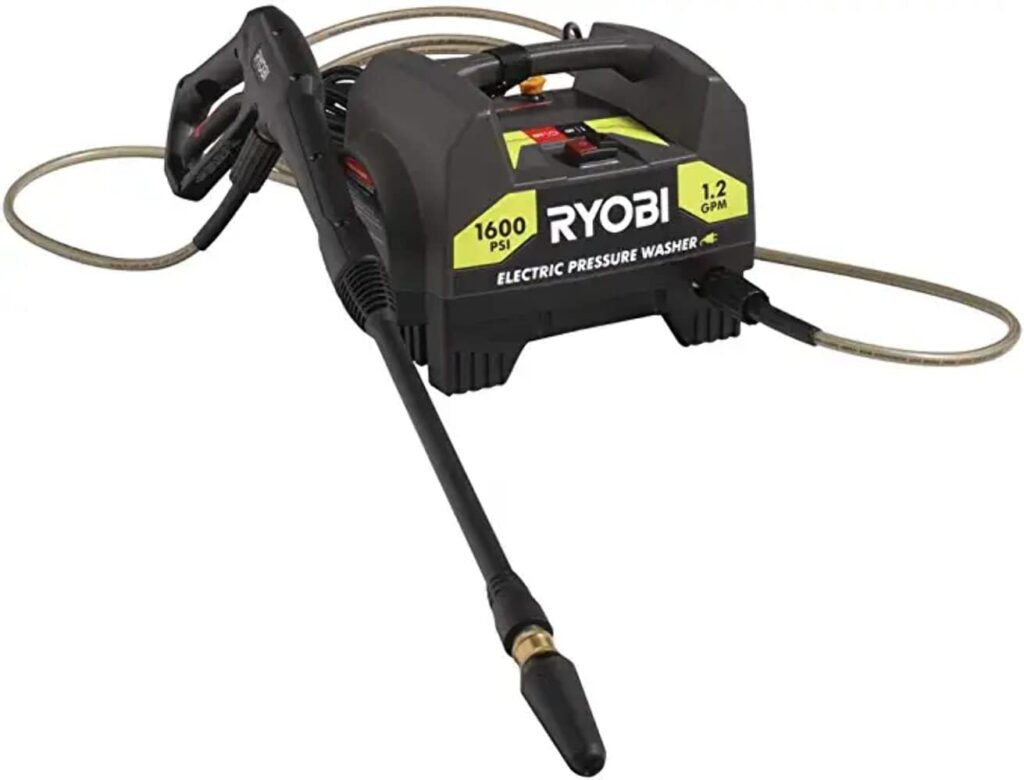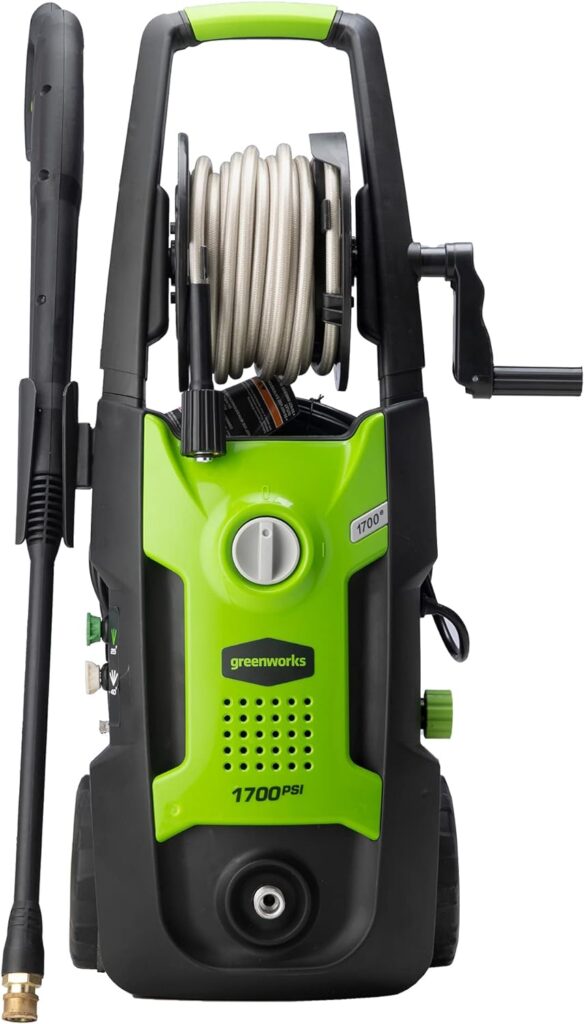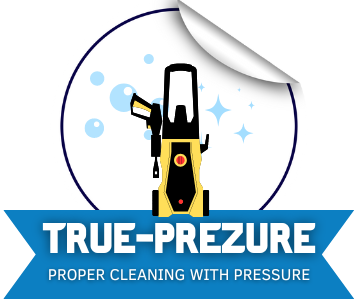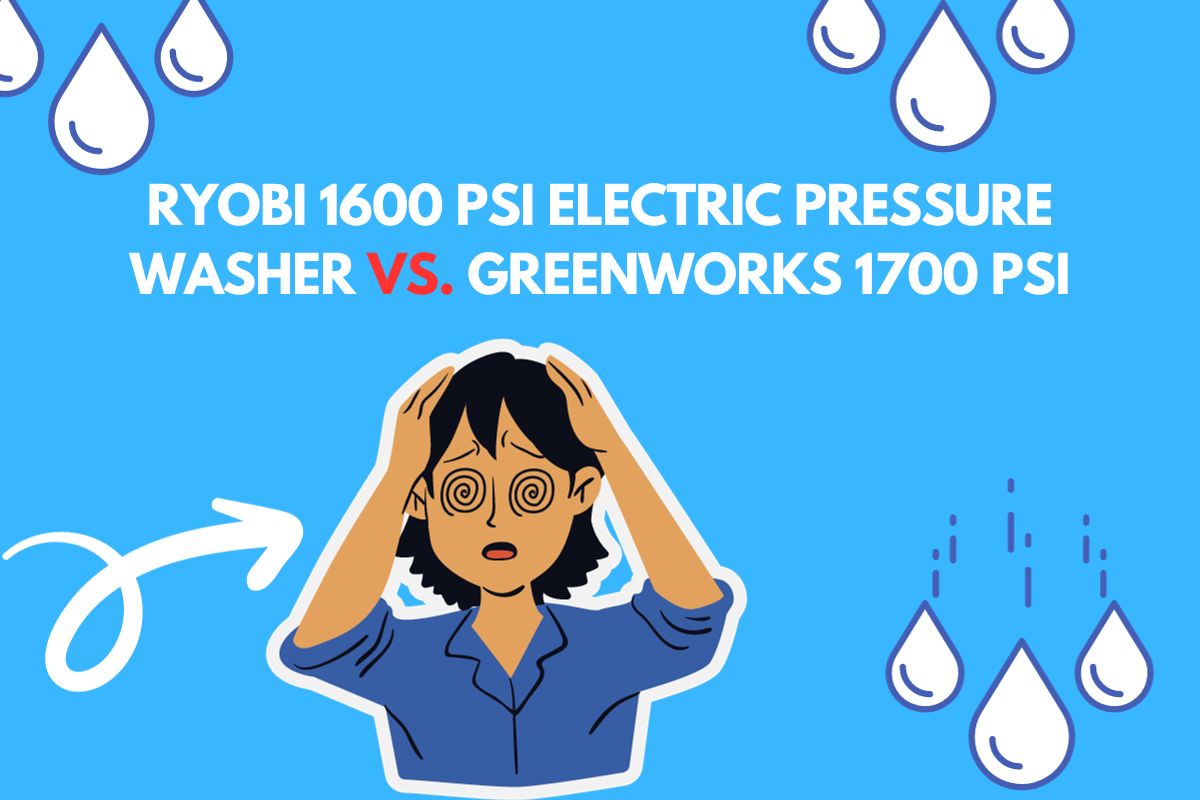In the world of outdoor cleaning, pressure washers have become a homeowner’s best friend. When it comes to choosing the right one, you want a tool that not only gets the job done but also fits your budget and specific needs.
In this showdown, we’ll pit two popular contenders against each other: the Ryobi 1600 PSI Electric Pressure Washer and the Greenworks 1700 PSI Electric Pressure Washer.
Let’s dive into the details and discover which one emerges as the cleaning champion.
The Basics: PSI Demystified
Before we jump into the battle, let’s unravel the mystery of PSI (Pounds per Square Inch). This pressure measurement determines a pressure washer’s cleaning power. The higher the PSI, the more force it exerts on surfaces. Understanding PSI is key to choosing the right tool for your tasks.
Ryobi 1600 PSI Electric Pressure Washer

Overview and Features
The Ryobi 1600 PSI pressure washer is a good quality electric model suitable for most residential cleaning tasks. It delivers a max of 1600 PSI and 1.2 GPM flow rate, which provides decent cleaning power to tackle dirt, grime, and light stains on surfaces like driveways, decks, patios, house siding, cars, grills etc. The electric start-up makes it easy to operate. Accessories like turbo nozzles and detergent tanks improve its cleaning versatility for different applications. Overall, the 1600 PSI Ryobi has very good cleaning capabilities for the price point, though it may struggle with extremely tough built-up gunk compared to pro-grade gas models.
Pros and Cons
- Advantages
- Efficient for light to medium-duty cleaning.
- Lightweight and easy to maneuver.
- Budget-friendly.
- Limitations
- Not suitable for heavy-duty tasks.
- Limited reach due to a shorter hose.
Greenworks 1700 PSI Electric Pressure Washer

Overview and Features
The Greenworks 1700 PSI electric pressure washer packs plenty of cleaning power in a compact, portable design. It delivers up to 1700 PSI and 1.1 GPM maximum flow rate, powered by an 80V rechargeable lithium-ion battery. This gives it strong cleaning capabilities for home use on surfaces like patios, cars, sidings, driveways etc. The brushless motor provides good durability and runtime per charge. Features like a soap applicator, 25 ft hose, and turbo nozzle allow you to tackle different cleaning tasks. While not as robust as gas models, the lightweight and quiet Greenworks washer is an attractive electric option for residential cleaning power and convenience.
Pros and Cons
- Advantages
- Ideal for a wide range of cleaning tasks.
- Longer hose for extended reach.
- Offers higher pressure for tougher stains.
- Limitations
- Slightly heavier than the Ryobi model.
- May be overkill for light cleaning.
The Showdown: Ryobi vs. Greenworks
Here is a comparison of the key factors between the Ryobi 1600 PSI and Greenworks 1700 PSI electric pressure washers:
PSI and Cleaning Power: The Greenworks has a slight edge with its 100 PSI higher max of 1700 PSI. This gives it a bit more oomph for heavy duty cleaning.
Design and Build Quality: Both use plastic frames but are fairly durable for home use. The Greenworks feels more premium.
Ease of Use and Portability: The lighter and more compact Greenworks (24 lbs) edges out the bulkier 37 lbs Ryobi for maneuverability.
Additional Features: They’re on par with detergent tanks, hose reels, nozzles. Greenworks has a brushless motor for longer life.
Price and Value: The Ryobi provides very solid value at around $150-$200 range. But the $300 Greenworks justifies its higher price with more power and cordless convenience.
Overall, the Greenworks is likely the better choice if you can afford the higher price. But the Ryobi gives you excellent cleaning capabilities for the money, making it a great budget-friendly option.
Which Pressure Washer Should You Choose?
If budget is key, go for the Ryobi for its excellent cleaning power at a more affordable price point. But for those wanting maximum portability, power and cordless convenience, the Greenworks is worth the higher investment. You can’t go wrong with either, just decide what factors are most important for your needs.
Sustainability and Environmental Impact
H1: Water Conservation
Find out how these pressure washers contribute to water conservation.
H1: Energy Efficiency
Which model is more energy-efficient in the long run?
H1: Eco-Friendly Cleaning Solutions
Explore eco-friendly detergents and solutions compatible with these pressure washers.
Hear from users who have achieved remarkable results with the Ryobi model.
Conclusion
As we wrap up this pressure washer showdown, we hope you now have a clear understanding of the Ryobi 1600 PSI Electric Pressure Washer and the Greenworks 1700 PSI Electric Pressure Washer.
FAQs
What is the main difference between Ryobi 1600 PSI and Greenworks 1700 PSI?
the Greenworks has a bit more power and portability but the Ryobi is more affordable upfront and has a higher water flow rate. For light duty home use, the battery-powered Greenworks may be the better choice while the Ryobi is good for longer heavy duty use if you need the gas engine runtime.
Are these pressure washers suitable for commercial use?
Neither the Ryobi 1600 PSI nor the Greenworks 1700 PSI pressure washer would be ideal for heavy-duty commercial use. While they offer decent residential cleaning power, commercial use requires more rugged durability and higher pressure ratings. For frequent professional use, gas-powered pressure washers in the 3000+ PSI range would be better suited to handle tough cleaning tasks on warehouses, equipment, vehicles, etc. The Ryobi and Greenworks lack the water flow rate, pressure, and duty cycle runtime needed for all-day commercial washing. For home or occasional use they offer good value, but professional-grade pressure washers would be a better investment for businesses.
How do I maintain and store my electric pressure washer?
- After each use, drain water from pump/hoses to prevent freezing damage. Wipe down exterior and wash detergent injector with clean water.
- Check/replace pump oil and filters per manual. Use fuel stabilizer if gas powered.
- Store indoors in a dry place. Disconnect battery if cordless. Coil hoses neatly to prevent kinks/damage.

